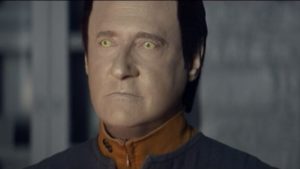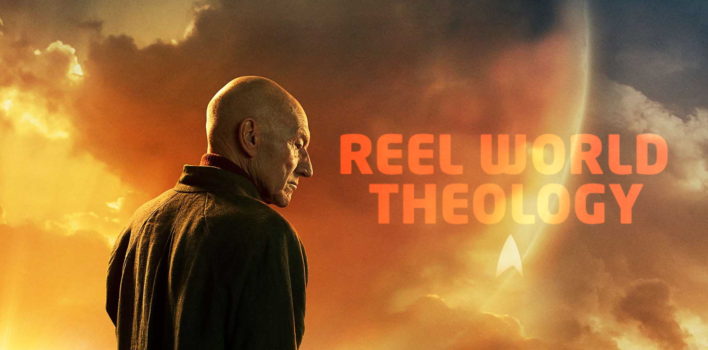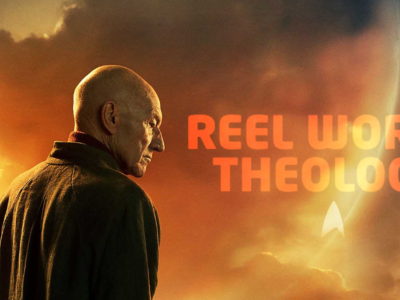“Et In Arcadia Ego, Part 2” – Star Trek: Picard S1E10
I struggled with how to start this review. I’m not only an enormous fan of The Next Generation, but I am particularly fond of Data and his relationship with Picard. Their bond was at the heart of TNG. It was Data’s quest for humanity and personhood that drove the show’s thematic exploration of the strange worlds inside the hearts of men. He got a bummer of a sendoff in the film Nemesis, much like the rest of the crew, and to see those loose threads of his story finally tied up (canonically, no less) with such a graceful touch, well…best I can say is it just hits you in the feels, man.
 Then they went and threw in a rather awesome appearance by Captain Riker in a way that did a bit of light fan service, gave Will and his former captain a moment of closure, and still felt very current. But that’s been the nature of Star Trek: Picard’s first season—a surprisingly well-balanced modern Trek story that beats with the heart of its past. Feels kind of like a highly advanced artificial lifeform, no? A fever dream, but a real good one.
Then they went and threw in a rather awesome appearance by Captain Riker in a way that did a bit of light fan service, gave Will and his former captain a moment of closure, and still felt very current. But that’s been the nature of Star Trek: Picard’s first season—a surprisingly well-balanced modern Trek story that beats with the heart of its past. Feels kind of like a highly advanced artificial lifeform, no? A fever dream, but a real good one.
This love letter of sorts to many things I hold dear does tackle some hefty theological questions, however; so I’ll try to contain my geeking out enough to examine them. The season was largely an extension of Data’s conundrum in the TNG episode “Measure of a Man” which asks if Data, an artificial being, is either a person or property. Does he have a soul? Does he have rights as any other organic being? Big questions, no doubt. And here is Picard, decades later, defending the rights of more artificial lives, Romulan refugees, and anyone else needing defense. Clearly he’s gotten pretty good at it.
Picard: You want to die?
Data: Not exactly, sir. I want to live, however briefly, knowing that my life is finite. Mortality gives meaning to human life, Captain. Peace, love, friendship; these are precious because we know they cannot endure.
The stance of Picard, Starfleet (at its core), and Star Trek throughout franchise history has always been that all life is precious. Hundreds of episodes have been spent asking similar questions about life, nature and what makes us human. But in this finale, the question asked is perhaps the biggest of all: why is life precious? When Data asks Picard to terminate his consciousness, which would end his life, his explanation is that mortality gives human life meaning. Life is precious because it ends.
 This tickles the theological side of my brain something fierce. On the one hand I’m apt to agree with Data. Watching my kids grow up proves to me without a doubt that life’s fleeting nature makes every moment so dear. Yet the Christian’s view of personhood is that we are souls who are image bearers of our Creator God, and as such we all carry inherent value that is eternal. Are these things mutually exclusive or not? Can life be precious because this world is fleeting and because the next one is not?
This tickles the theological side of my brain something fierce. On the one hand I’m apt to agree with Data. Watching my kids grow up proves to me without a doubt that life’s fleeting nature makes every moment so dear. Yet the Christian’s view of personhood is that we are souls who are image bearers of our Creator God, and as such we all carry inherent value that is eternal. Are these things mutually exclusive or not? Can life be precious because this world is fleeting and because the next one is not?
I really am no expert on the theology of heaven and hell. But I imagine that if our eternity was just a complex quantum simulation (there’s that infamous Trek-babble we love), it would rob away some of the joy. Reel World staff writer David, who partnered with me on reviewing this season, credits his wife Natalie for pointing out that Data’s “afterlife” was only eternal in measure, not in kind. He just exists. He doesn’t really live. Picard’s favor to Data was therefore a mercy.
After the fall and the curse, it was also a mercy for God to grant Adam and Eve death because He knew that eternal life without him would be a literal hell. (I credit David again for that point.) So eternal life with our Creator gives value to our lives by knowing that we can live on where we were created to be—in communion with Him. So perhaps the answer lies in the middle: mortality does give our lives meaning, and it is in direct correlation to the gift of eternal life. Knowing that this life is short but not the end calls us to value every life on an eternal scale.
Soji: We have no choice. You organics have never given us one.
Picard: To say that you have no choice is a failure of imagination.
There’s certainly no failure of imagination in this finale. It balances spectacle with substance beautifully. Hundreds of Romulan ships shooting lasers at giant space orchids while Picard teaches Soji about her own choice and gives his life for it is just about all you can ask for from Trek. His choice to sacrifice himself so he could teach a valuable lesson and give someone a better life is so very Picard (the character) and Picard (the show). It’s also quite refreshing to have a self-contained story that brings a satisfying conclusion. Credit for that is no doubt to novelist and showrunner Michael Chabon.
 There are some glaring holes to be poked through. Namely, if Soong can store Data’s memories and create new androids, he certainly could recreate Data. That might be against his wishes, but they might have addressed it. After all, Soong recreated Picard, a problematic science fiction conceit that we’ll give a pass for now. If Picard can teach Data how to be human, I think it’s an acceptable bookend that Data returned the favor and taught Picard how to be synthetic.
There are some glaring holes to be poked through. Namely, if Soong can store Data’s memories and create new androids, he certainly could recreate Data. That might be against his wishes, but they might have addressed it. After all, Soong recreated Picard, a problematic science fiction conceit that we’ll give a pass for now. If Picard can teach Data how to be human, I think it’s an acceptable bookend that Data returned the favor and taught Picard how to be synthetic.
In the end, it wasn’t an easy task to keep one foot in the Next Generation while the other steps into, well, what’s next for it. But this fan left happy with the attempt. With Guinan on tap for season two and Worf potentially out there at the head of the Enterprise, I’m not sure how I can wait for more. But I think the break will be good. It’s good to reflect on things as they leave us. Remembering what characters real and fictional brought us during their time is essential. It proves the eternal measure of their life and ours. And it proves their life is precious.





